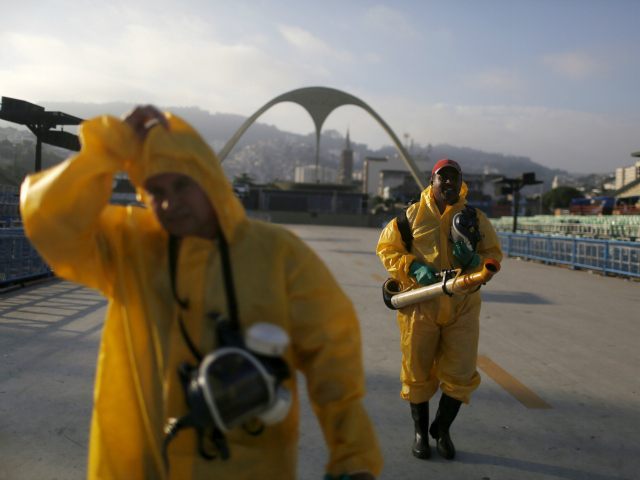A new study finds that up to 2.2 billion people worldwide are at risk of contracting the Zika virus, which can cause irreparable damage to unborn children and painful nerve damage.
The study adds to the woes looming over Brazil – the epicenter of the Zika outbreak – as the nation prepares to welcome thousands for the 2016 Summer Olympics.
The study – published in eLife, a medical journal – uses a different metric than previous studies to find the range where the virus can be expected to spread. Scientists have found two ways of contracting Zika: a bite from the Aedes aegypti mosquito, a carrier, or transmission through sexual contact with a person carrying Zika. Previous studies attempted to tie Zika’s spread to the range of Aedes aegypti by documenting the spread of other diseases tied to the mosquito, such as Chikungunya, Dengue, or yellow fever.
“We are the first to add the very precise geographic and environmental conditions data we have on Zika,” Dr. Oliver Brady, who worked on the study, told the BBC. The study consists of a map that documents at-risk areas. 2.2 billion people live in the areas cited.
“Mosquitoes are just one condition needed for Zika to spread but there’s a whole range of other ones. It needs to be warm enough for Zika to replicate inside the mosquito and for there to be a large enough [human] population to transmit it,” Dr. Brady added.
The Zika virus originated in Africa, but the current outbreak began in Brazil, where the government has documented 4,000 cases of microcephaly believed to have been triggered by the Zika virus. Microcephaly is a birth defect in which a child’s skull is too small for his or her brain, crushing the brain and severely limiting the child’s cognitive abilities. There are few estimates of the number of Zika cases in Brazil in general because of the nature of the virus; up to 80 percent of those infected are asymptomatic, and many mothers do not know they have had Zika until they give birth to a baby with microcephaly.
Zika panic has been exacerbated in Brazil by weak medical infrastructure. An exposé in the Los Angeles Times found that the Summer Olympics host city, Rio de Janeiro, was forced to limit its services because of a lack of funding, leaving medical workers unpaid and ill-equipped to perform basic services. The Times also witnessed patients waiting for extended periods of time as doctors tried to fix old and faulty machinery.
The LA Times notes that doctors there have nonetheless concluded that the cases of microcephaly they have seen linked to Zika are significantly worse than those they see caused by alcohol or drug consumption during a pregnancy. The feature also found that, for mothers of children with Zika-induced microcephaly, among the most painful aspects of raising their child is social curiosity. “People come up to me and want to look at the size of her head,” one mother tells the Times. “They are surprised because they think her head is not that small. They say babies with microcephaly are ugly babies.”
Brazil’s government has deployed 220,000 soldiers to the hardest-hit areas to help clean potential mosquito nests and raise awareness about how to prevent Zika, as well as convince couples to forgo having children if they can. It is the largest military operation in the history of Brazil.
A Brazilian ad agency has also developed a novel way to trap the offending mosquitos: billboards that simulate the smell of human sweat, attracting mosquitos and then trapping them. The billboards have been installed in Rio de Janeiro.
Brazilian authorities do appear concerned that some Olympics facilities will not be completed in time. Part of the problem is a massive corruption probe that has ensnared dozens of politicians and involved multiple Olympic venues. On Wednesday, a federal prosecutor confirmed to Reuters that multiple Olympics projects are being investigated.
Brazil’s president, Dilma Rousseff, faces impeachment for illegally misrepresenting the state of the Brazilian economy. Eduardo Cunha, the speaker of the House of Representatives responsible for the impeachment push, is being investigated for taking up to $5 million in bribes on infrastructure projects.
The scandal has hit the Olympics, as major officials have resigned in disgust. Citing his personal “shame,” the official in charge of Olympic security resigned earlier this month. The minister of tourism resigned a week earlier, citing a lack of confidence in the president.

COMMENTS
Please let us know if you're having issues with commenting.